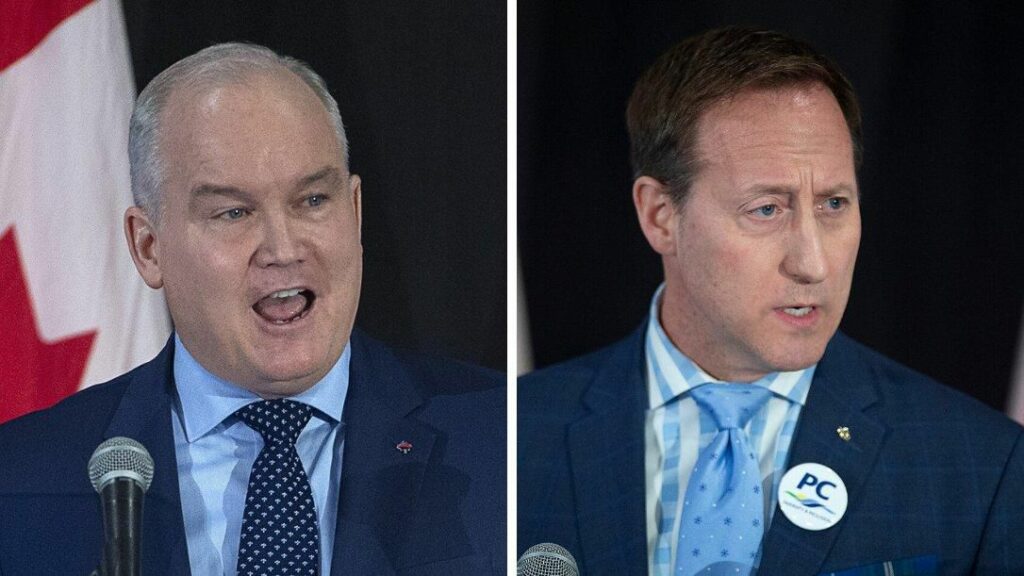Blog Post
The bankruptcy of Canadian conservatism (and how it got that way)
By Jonathon Van Maren
Across the Western world, political paradigms are shifting. In the United Kingdom, Boris Johnson’s Tories are exploring new coalitions that have the potential to redraw the electoral map and political history in the process. In the United States, the traditional GOP establishment has been vanquished by a populist Manhattan billionaire, with millions of dissatisfied voters up for grabs. Conversations about the role of nationalism, the possibilities of a political agenda fusing traditionally left-wing economic ideas with socially conservative ideas, and the role of political correctness in poisoning politics at large are being had from Westminster to Washington, D.C.
In fact, the conservative movement is engaged in vital debates almost everywhere. Everywhere, that is, except for Canada.
I’ve been asked many times over the last couple of years: Why is it that Canada appears impervious to any form of genuine conservatism? Even Conservative prime minister Stephen Harper shied away from anything too conservative (and, as we’ll note later, left Canada much worse off as far as social conservatives are concerned). His discussion with Ben Shapiro in 2018 featured Harper attempting to equate pragmatism as populism, and his book Right Here, Right Now: Politics and Leadership in the Age of Disruption, while occasionally insightful, offered much the same analysis.
There are a few key reasons why many of Canada’s Conservative politicians, even though they are often prone to dreamily musing in private about all of the policies they would like to pursue, become gun-shy the moment they actually (as Harper did) have the opportunity to do so. Here are just a few of them (although I emphasize that this is in no way an exhaustive list or a comprehensive analysis.)
For starters, Canada’s political party system is, in many ways, barely democratic. Many people suffer under the illusion that if you want to get something done, you simply have to marshal enough support: Select a candidate, win a party nomination race, and then win the election. In fact, Canada’s major political parties maintain stringent control over nominations, and reserve the right to get rid of candidates that they find troublesome. Justin Trudeau’s Liberals have an abortion litmus test, with all MPs having to vote the party line. The Conservative Party (and provincial allies) regularly remove candidates for saying anything they consider to be politically damaging. It hardly has to be said that perceived enthusiasm for social conservative causes is not smiled upon by the bureaucrats that run the Conservative Party.
Thus, being a great candidate with a lot of local support and the ability to win a nomination race doesn’t mean that you can actually become a candidate. The unelected party apparatus decides that, and candidates are scrupulously vetted by party operatives. This is not surprising, of course—political parties want to minimize any nasty surprises during election time and minimize the number of candidates who might cause them a media headache. And Canada’s media, of course, exists almost entirely in a progressive silo, and thus is on the hunt for any perceived phobias than can be used to batter the Conservatives. Liberal strategists are more than happy to provide them with oppo research detailing social media sins that can be portrayed, without context, as irredeemably transphobic or bigoted or what-have-you. That was their primary strategy in the last federal election until Trudeau’s blackface photos surfaced, making much of their research unusable (after all, no Conservative candidate had ever done anything that explicitly racist.)
These pressures result in a Conservative Party that is becoming increasingly less conservative. Constituents have far less say over who their candidate is, because the staffers of Canada’s right-leaning parties are so paranoid of the inevitably bad press coverage that they are frequently willing to toss their own candidates under the bus, regardless of how fair or accurate the attacks are—thus proving the success of these tactics and ensuring that they will be used with ever more frequency. It is a strange thing, but many of the strategists of Canada’s conservative parties will say that both a) our media is biased against conservatives and that b) the media’s analysis of why conservative parties lose—i.e., they aren’t liberal enough—is correct. They never explain why we should accept advice from sources that a) hold conservatives in contempt and do not understand them and b) have no vested interest in their electoral success. But over and over again, they do.
Canada’s media monolith is also a huge problem for conservatives. In the U.S., irrespective of what you think of FOX News or MSNBC, there are both right-wing and left-wing media outlets, and these outlets collectively drive the conversation. The same is true for the United Kingdom. Canada, meanwhile, has no conservative media to speak of. The National Post is the friendliest to conservatives, having been founded by Conrad Black, who still occasionally writes about Canadian politics. Canadian TV is an airtight bubble. There is no National Review, or Human Events, or any other prominent conservative publication that helps to shape the national discussion. As a result, conservatives can be easily tarred as bigots for believing what people in the West have believed for 2,000 years, and find themselves virtually without defenders on the airwaves, in print, or on the tube (unless you follow Ezra Levant’s outfit, The Rebel, which lost any shot at impacting the national debate with their 2017 meltdown.) In response to withering fire from the media, the Conservative Party generally ducks, weaves, and then surrenders.
This is one of the key reasons that frustrated conservatives in Canada watch other Western countries engage in muscular debates about the future of conservatism in politics while their own leadership candidates fall all over themselves to assure the state broadcaster that they’ll march in Pride. If I asked anyone to name some American or British conservative thinkers, a dozen or more names would easily pop out. But who are some prominent Canadian conservative thinkers and commentators? Twenty years ago William Gairdner and Ted Byfield would have been prime candidates for this category. George Jonas is gone now. Rex Murphy releases a scathing broadside in the Post every few weeks. But unless you’re the sort of person who thinks the Manning Conference features robust debates about the future of conservatism rather than a tired tradeshow attended by the usual suspects, I’ll bet you’d have a hard time naming even four or five commentators who could qualify. Our media is so far Left that Jonathan Kay of Quillete, a pro-choice, pro-gay rights liberal, is considered beyond the pale by many of Canada’s progressive pundits because he defends freedom of speech and questions elements of woke orthodoxy.
As a result, in the months following the 2019 federal election a number of Conservative MPs and strategists and a handful of columnists announced that it was time for the Conservative Party to move forward with some New Ideas rather than the tired tax cut tropes that Scheer had so much difficulty selling. The Conservative Party needed to have a Real Vision to compete with the left-wing parties—on this point, everyone seemed to agree. And that was pretty much that. A consensus emerged that New Ideas must be put to the Canadian public, but, urged on by the media who managed to frame Scheer’s loss as a referendum on social conservatism, it also seemed to be agreed that these ideas couldn’t be conservative ones, unless by conservative you meant just a titch to the right of Justin Trudeau. Bold stuff, I’m sure you’ll all agree. The New Idea now appears to be a Conservative Party that is in favor of new ideas, but they can’t tell you what those are (unless you’re wondering if they’re willing to march in Pride in which case yes, yes they are.)
Contributing to all of this is what I call the Harper Effect. Stephen Harper still looms large over the Conservative Party, and he is one of the primary reasons that social conservatives have such a difficult time getting traction (even though they currently make up a majority of the caucus.) It was Stephen Harper’s aggressive silencing of social conservatives and his repeated insistence that socially conservative issues are untouchable that has persuaded center-right parties across Canada that electoral victory is only possible when social conservatives—who have proven time and time again to be one of the most active and invested factions of the conservative coalition—are kept in the tent but off the platform. In fact, even Harper’s judicial appointees were progressive: Both the Trinity Western case and the Carter case (assisted suicide) were passed down predominantly by Harper appointees. When Trudeau took power, Harper had appointed 600 of the 840 full-time federally appointed judges. He could have transformed Canada’s judiciary. He did—but not for the better. From a socially conservative perspective, Canada was worse off when Harper turned the keys for 24 Sussex over to Pierre’s kid.
Even if a solidly conservative candidate with bold conservative views and a willingness to act on them wins the nomination, gets approved by the party, and then wins a seat in Parliament, it is very difficult for an individual MP to accomplish anything. The Prime Minister’s Office or the Office of the Leader of the Opposition, depending on whether or not they hold government, micro-manages MPs right down to their social media postings, demanding near total conformity. Comms staffers and strategists that nobody outside of the Ottawa bubble has ever heard of scurry to the offices of MPs who won tens of thousands of votes to imperiously demand that they take down any post that might attract controversy (unless it’s been focus-grouped to death) and to re-post whatever pablum the leader has been fruitlessly pumping out. Again, unelected staffers have an enormous amount of influence over what actually happens—and keep in mind that these staffers have never actually had to face the voters themselves, unlike the MPs they attempt to corral on behalf of the leader.
These are just a few of the factors that have, thus far, prevented any real form of conservatism from taking root. Stephen Harper ensured that social conservatives would be seen as unfortunately necessary party pariahs, and the media have worked overtime to ensure that this perception stays front and centre in the minds of Conservative politicos. Thus, party operatives work to squelch nomination and candidates they believe might be problematic, and seek to muzzle MPs once they achieve office. The media is monolithic, and with no effective opposition wields the ability to attack and smear genuine conservatives almost at will, while receiving tens of millions of government dollars to do so (in the case of the CBC, over a billion annually.) And so Canada’s Conservative Party limps along, with leadership candidates pathetically assuring everyone that they’ll march in Pride and get pipelines to tidewater—and pretty much nothing else.









“In fact, even Harper’s judicial appointees were progressive: Both the Trinity Western case and the Carter case (assisted suicide) were passed down predominantly by Harper appointees. When Trudeau took power, Harper had appointed 600 of the 840 full-time federally appointed judges. He could have transformed Canada’s judiciary. He did—but not for the better.”
Jonathan, I beg you, don’t import the American impulse to pack the courts with partisan judges. The judiciary needs to stay apolitical to protect the rights of all Canadians. Once the Supreme Court becomes political, one party or the other in power can do whatever it wants and there is no check on the executive’s power.
Packing the courts is one of the worst decisions a country can make. Keep the judiciary independent!
This is a ridiculous comment. The point is not that court-packing doesn’t happen in Canada. The point is that only the Left does it. That’s how we got justices tossing out decades worth of precedent, and rewriting Canadian law at a whim. Trudeau himself interferes directly in the selection process (as the Wilson-Raybould scandal illustrated to us.) That is why conservatives lose even when we win: Because the revolution of the Left continues from the bench.
I don’t necessarily disagree with you that the parties in power try to pick judges that align with their values; however, they have not been successful in appointing judges aligned with the political parties and the judges tend to rule fairly when appointed. Generally speaking, the judiciary does a good job of staying apolitical.
Perhaps, instead of “court packing” and making the court political, we should introduce rules to ensure it doesn’t happen? Court packing simply leads to the balance of power shifting slowly from one side to another and we should never be able to forecast whether the government wins or loses simply because there are more registered liberal justices than registered conservative justices. That makes a mockery of justice and makes the results in essence a “whipped vote”.
What the country needs is a stable, independent judiciary that is not beholden to the political parties and their to and fro.
The Wilson-Raybould scandal had absolutely nothing to do with judicial appointments, but rather whether or not a company should be punished more or less harshly. It is illogical and factually wrong to accuse Justin Trudeau of “court packing” based on interference in a criminal prosecution – the whole scandal revolved around prosecutor recommended criminal punishment, not around appointing judges.
You’re also engaging in dangerous hyperbole: “tossing out decades worth of precedent and rewriting Canadian law at a whim”. That is an opinion, but I challenge you to actually show that is the case rather than emphatically stating it as fact.
I would suggest instead that Canada is in general a progressive nation and any change to the law reflects that fact.
I find it very sad that your solution to your identified problem is more of the alleged problem, rather than implementing a fix.
While the supreme Cory is generally impartial, on social issues not directly addressed in constitution or other legislation, it has the ability to interpret application. In those cases the political atmosphere and their own biases play a role.
I can, generally, agree with your comment.
The question is whether the Supreme Court should allow the political atmosphere / public opinion to effect matters of policy that are not explicitly stated in the Constitution. I think it is a good thing, as we don’t require exhausting and difficult amendments to the Constitution to address new issues.
Great insight, Jon! Maxime Bernier’s Peoples Party is the only truly Right Leaning political party. Their time will come and that could be sooner than later. This is where the knowledgeable conservatives are. With their wallets!
There is also the CHP with very practical policies. Here’s hoping many socons will join once a red Tory grabs the CPC reins. As Jonathan rightly points out, even if a socon wins leadership of the CPC he will probably be unable to affect any real changes.
Shows the need for some form of Proportional Representation which we should have had by now. In 2019, in protest of not being able to support the so-called conservatives, I decided to run for the Christian Heritage Party, and chose the Hamilton-Centre riding for my battleground. I never felt that I could not say something I believed in and be kicked out as a candidate. Proportional Representation would only be fair to all eligible voters!